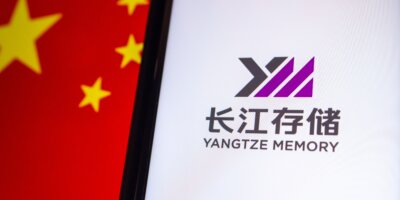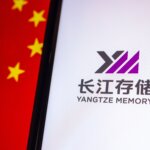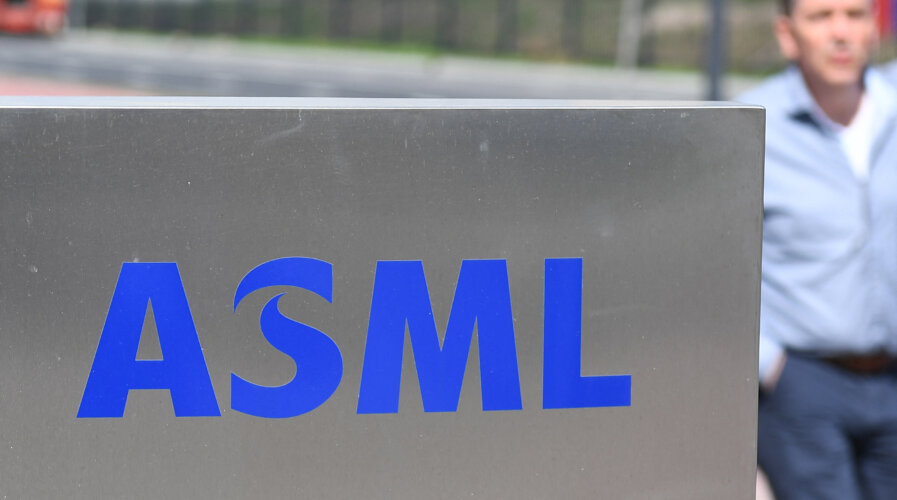
ASML canceled China machine shipments at the US request before the chip equipment export ban was enacted. (Photo by EMMANUEL DUNAND/AFP).
China defies US pressure as Netherlands’ ASML curbs chip machine exports
- ASML canceled China machine shipments at US request – before the chip equipment export ban was enacted.
- ASML was licensed to ship three top-of-the-line lithography machines to China until this month – when new restrictions kick in.
- Chinese experts reckon that China is now beyond the point of being stifled by a US-led technology crackdown.
In October last year, President Joe Biden’s administration unveiled an expansion of export restrictions aimed at impeding China’s capacity to produce advanced semiconductors. The measures, aimed at exporting advanced chips from Nvidia and lithography machines by ASML, specifically targeted the NXT1980Di containing US-made components. Shortly before that, in June of the same year, the Dutch government imposed restrictions on the export of ASML’s advanced chip manufacturing tools, citing national security concerns.
Dramatic action
Those US and Dutch restrictions have effectively severed the export of all advanced DUV machines to China. However, ASML offers immersion deep ultraviolet (DUV) lithography machines, known as the NXT:2050i and NXT:2100i, which are employed to produce slightly less advanced chips. In an unexpected turn of events, that supply has also been halted.
According to a statement released on January 1 by ASML, a license for the shipment of its NXT:2050i and NXT:2100i lithography systems in 2023 has also “recently been partially revoked by the Dutch government.” ASML also said that in recent discussions with the US government, the company has “obtained further clarification of the scope and impact” of the 2023 October updated export controls.
These curbs “impose restrictions on certain mid-critical DUV immersion lithography systems for a limited number of advanced production facilities.” For context, ASML specializes in selling lithography machines crucial for the chip manufacturing process. Among its offerings is the extreme ultraviolet (EUV) lithography machine, designed for producing cutting-edge chips, including those featured in Apple products.
Unfortunately, ASML has been facing export restrictions on that front, too, preventing the shipment of its EUV lithography machines to China for several years, with no such machines sent to the country thus far. In short, the Dutch manufacturer had licenses to ship only three top-of-the-line DUV lithography machines to Chinese firms till January this year, when new Dutch restrictions took full effect.
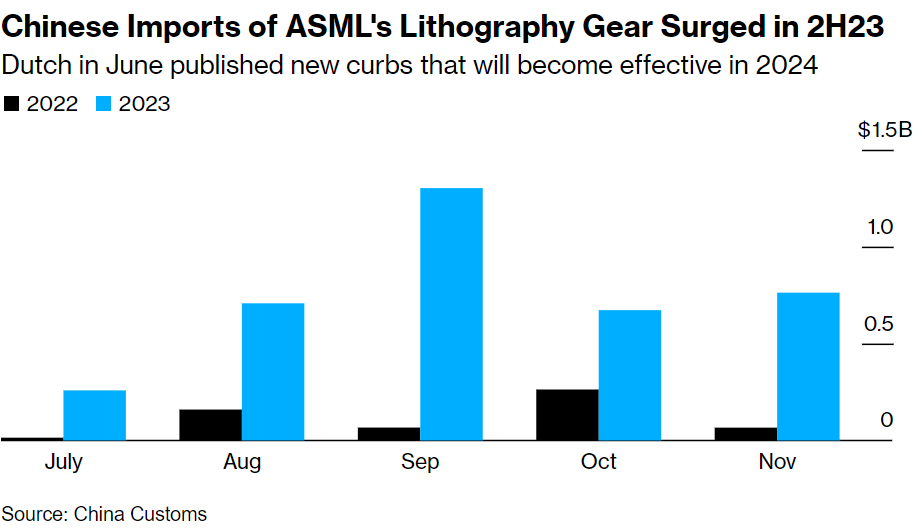
Between July and November, China’s imports of lithography machines surged more than five times to $3.7 billion, according to Chinese customs data. Source: Bloomberg.
Even that didn’t fully materialize as planned, with US officials reaching out to ASML to ask it to immediately halt pre-scheduled shipments of some of the machines to Chinese customers. Biden is tightening the screws on Beijing’s ambitions to forge its cutting-edge semiconductor sector, with the US and its allies putting up barriers to imported technology.
Notably, China’s Huawei Technologies Co. managed to craft a smartphone challenging Apple Inc.’s iPhone last year, employing state-of-the-art chips prepared through ASML’s immersion lithography machines, as reported by Bloomberg News.
Opposition rises as US cracks down on ASML exports to China
The Chinese government has vehemently opposed the latest move by the US and Netherlands. Chinese experts argue that the latest restrictions are more of a probing nature than causing substantial harm, highlighting China’s strengthened position in the face of ongoing technology containment efforts by the US.
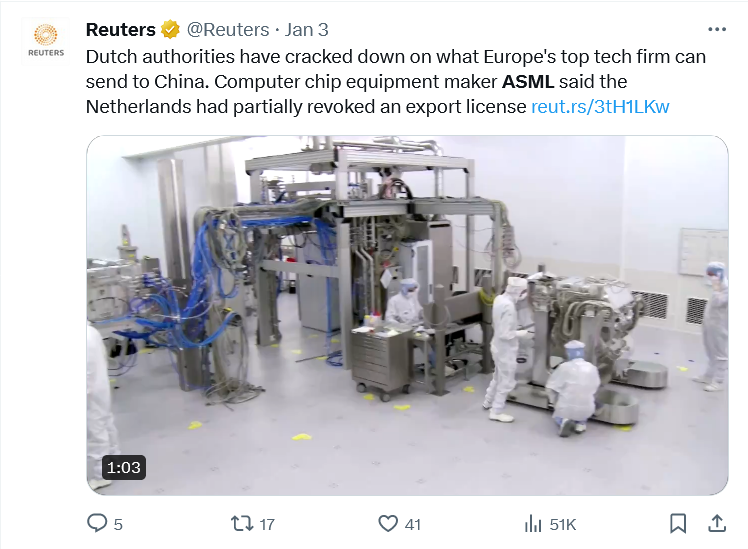
ASML restricted from selling to China.
According to an article by the Global Times, experts further suggest that the US move appears to be a diplomatic gesture aimed at appeasing anti-China sentiments within its borders, emphasizing that China has surpassed a critical point where it could be significantly affected by a US-led technology crackdown.
Chinese Foreign Ministry spokesperson Wang Wenbin expressed China’s strong opposition to what he referred to as the US’ hegemonic and bullying practices, violating international trade rules and disrupting the global semiconductor industry structure. Wang emphasized the impact on the security and stability of international industrial and supply chains.
Wang urged the Dutch government to honor contractual agreements and take concrete actions to protect the mutual interests of China and the Netherlands, as well as the companies from both nations. He affirmed China’s commitment to defend its legitimate rights and interests resolutely.
Highlighting the global nature of the semiconductor industry, Wang warned that the US actions would inevitably have repercussions in a profoundly integrated world economy. “Semiconductor is a highly globalized industry. In a deeply integrated world economy, the US actions will surely boomerang,” Wang noted.
The unfolding situation underscores a complex battle for technological independence, with China standing firm in the face of external pressures and asserting its role in the highly globalized semiconductor landscape.
READ MORE
- Strategies for Democratizing GenAI
- The criticality of endpoint management in cybersecurity and operations
- Ethical AI: The renewed importance of safeguarding data and customer privacy in Generative AI applications
- How Japan balances AI-driven opportunities with cybersecurity needs
- Deploying SASE: Benchmarking your approach

